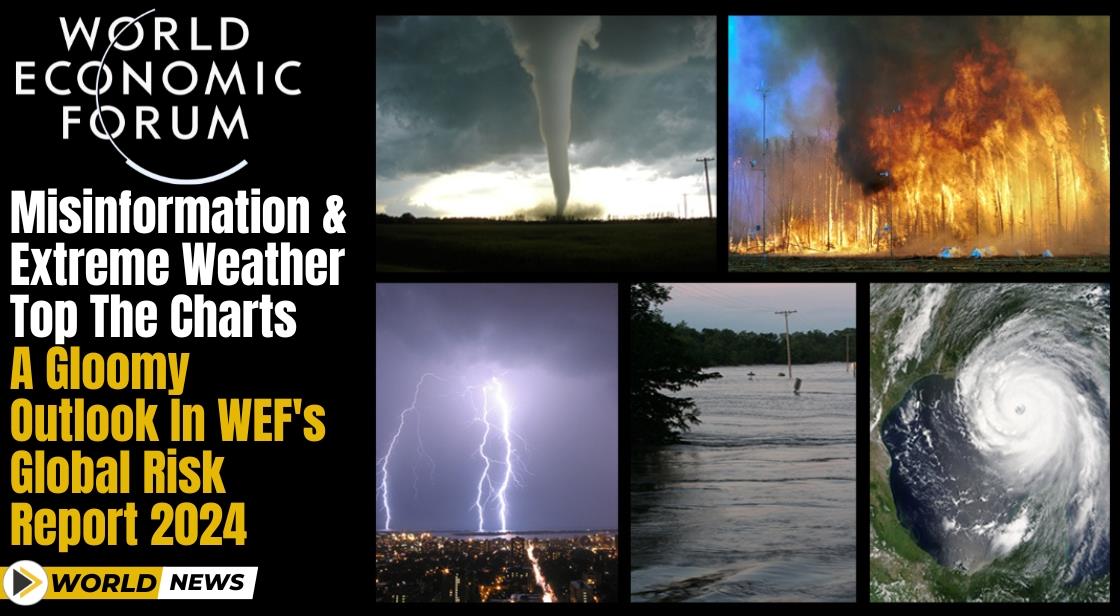Misinformation and Extreme Weather Top the Charts: A Gloomy Outlook in WEF's Global Risk Report 2024

News Synopsis
With billions heading to the polls in major democracies like India and the US in the next two years, a chilling reality emerges from the World Economic Forum's (WEF) annual Global Risks Report: misinformation and societal polarization pose the most immediate threats to the world.
India on the Edge: For our nation, the report paints a particularly concerning picture. Misinformation and disinformation occupy the top spot among the five biggest short-term threats facing India, highlighting the potential for manipulation and unrest during the upcoming elections. Infectious diseases, economic crime, income inequality, and labor shortages follow closely behind.
A Long-Term Looming Shadow: Looking further ahead, the report paints an even bleaker picture. Extreme weather events take center stage as the most significant global risk over the next decade, reflecting the worsening climate crisis.
Critical changes to Earth systems, biodiversity loss, and resource shortages join misinformation in the top five long-term threats, painting a concerning picture of a planet teetering on the edge.
Fractured Future: The WEF report warns of a world where progress in human development is steadily diminishing, leaving nations and individuals vulnerable to a new breed of risks. Shifts in global power dynamics, technology, climate, and demographics are stretching our collective adaptative capacity to its limits.
Cooperation Under Fire: The report further casts a shadow on global cooperation, suggesting that urgent issues might face increasing neglect in the coming decade. Rising multipolarity and fragmented world orders might complicate the fight against shared threats, requiring innovative approaches to risk management.
Misinformation: Weaponized and Rampant:
As the immediate risk, misinformation emerges as a potentially destabilizing force. Foreign and domestic actors are expected to weaponize it to amplify societal and political divides, particularly during the upcoming elections in nations like India, Bangladesh, Indonesia, and the US.
The report warns of potential political unrest, from protests and hate crimes to civil confrontations and even terrorism, all fueled by the flames of disinformation.
Double-Edged Sword: The growing threat of misinformation paradoxically fuels another risk: domestic propaganda and censorship. Governments, in their attempts to combat misinformation, might resort to increased control over information flows, potentially jeopardizing already declining freedoms of the internet, press, and access to diverse information sources.
A Call to Action:
The World Economic Forum's (WEF) report paints a picture of a world facing complex and interconnected challenges. While its outlook appears bleak, it also serves as a wake-up call. Embracing genuine collaboration, investing in resilient infrastructure, and prioritizing sustainable solutions are crucial steps towards navigating the increasingly turbulent landscape of global risks.
By working together, we can mitigate the threats and build a future where both India and the world can thrive.
Risks to Information Freedom and Control
As misinformation takes precedence, the risk of domestic propaganda and censorship could rise. Governments might increasingly seek control over information based on their definitions of truth, potentially impacting internet freedoms and access to broader sources of information.
In summary, the WEF study identifies misinformation as an immediate global risk, while extreme weather events pose a significant long-term threat. The report emphasizes the need for coordinated efforts to address these risks in an ever-evolving global landscape.
You May Like









